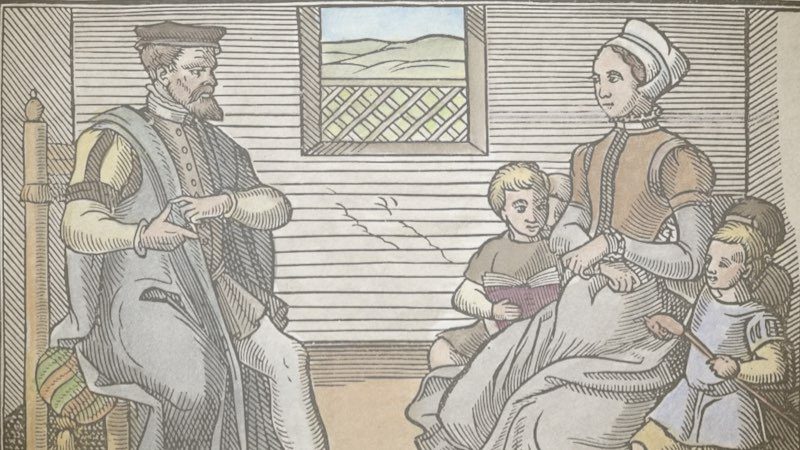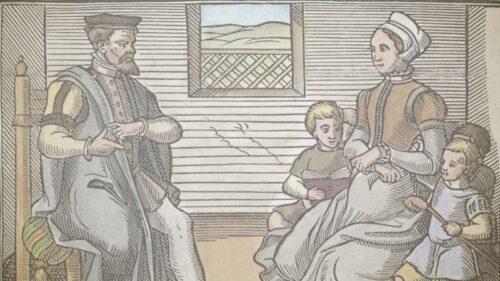
Introduction
The history of the little work now in the reader’s hands, is briefly this. Among the private documents, belonging to one of the most respectable families under the parochial charge of the present writer, there has long been preserved, with pious care, a manuscript autobiography of one of its ancestors, who, as a persecuted Huguenot, endured much for the sake of his faith. It was the labour of his latter days to prepare for his descendants the record alluded to, as a memorial of his gratitude for the Providence that had sustained him in many dangers and trials, and as an admonition to his posterity to adhere to the faith for which their forefathers hazarded life. The work, which extended to several hundred pages, was written in the French language, and without any view to publication.
In the friendly confidence growing out of parochial relations, the existence of this manuscript became known to the writer of this introduction. Curiosity led to its examination; the strange and interesting nature of the incidents it recorded, related as they were with unpretending simplicity, soon fixed his attention. It struck him as being a vivid picture of by-gone times sketched by an honest eye witness; and the page of past history thus illustrated was not the least interesting in the records of Protestantism.
There was also, as it seemed to the writer, many an useful lesson to be gathered from the leading events of the story. Independent of the spirit of piety that pervaded the book, and of the testimony it afforded to the doctrine of God’s providential care of the Christian, who in humble faith cast all his care upon Him, there were valuable lessons of wisdom, applicable to “the life that now is;” and it was thought that youth might here find an example worthy of its imitation.
Here was the spectacle of a man, accustomed in his early days to the enjoyments of a competent estate, and educated accordingly, who, for conscience sake, resisting the oppression and persecution of himself and his countrymen with indomitable courage, was, at last stripped of all, and obliged to abandon his country. An exile in a strange land, ignorant of its language, unaccustomed to manual labour, and with the refinement of feeling belonging to his education and former rank in society; he felt that he was thrown upon his energies as a man, and nobly girding himself to the work before him, he trusted in his Maker, and proved that if true to God and true to himself, man need never despair.
He who had enjoyed the case of affluence, and found occupation and delight in the pursuit of letters, accommodating himself to his altered situation becomes an artisan and works at his trade; and soon by his science, observation and industry, distances all his companions of the same craft. Persecuted out of his calling, because he had been guilty of success in it; with a perseverance accustomed to remove obstacles, he finds another occupation, and again directing all his faculties to his business, he again succeeds. More than once losing his all, he yet never desponds, but sets about retrieving his losses with the willing industry of one who never knew a reverse of fortune. In the midst of all this, he finds time to train his family in the fear of God, devises means to educate them for respectable callings, and lives to see some of them among the first and most esteemed ministers of the Gospel in Virginia.
The example of such a man is surely a lesson for youth. Now a scholar, and now a manufacturer; now a civilian, and now a soldier, he may be seen, at one time enjoying letters, and at another, labouring with his hands for bread; on one day he will be found asserting the rights of the oppressed before the courts of the oppressors; and on another he is withstanding a siege. In all situations, he bears himself with the noble spirit that becomes a man for he never loses his great trust in God, nor his proper confidence in himself.
It has been remarked more than once that this country has never had better citizens in it than the Huguenots and their descendants. The instances are rare indeed in which one of that stock, has been charged with crime before the tribunals of the land. The descendants of the man, a sketch of whose biography is in the reader’s hands, only confirm the truth of these observations. Many hundreds of them are now among our countrymen. Some of them have been, some now are, clergymen of worth and usefulness, some have been at the bar, some in the halls of legislation, some in important public offices and we have yet to learn the name of that one who has disgraced himself, his ancestry, or his country.
These, and kindred reflections passing through the writer’s mind induced him to believe that extracts might be made from the manuscript before him, worthy of publication, and he made a suggestion to one of the members of the family to prepare the work. In proposing the measure, he had in view chiefly the benefit of the young, though he thought the book would have interest for all. His suggestion was adopted, upon the condition that he would explain the circumstances connected with the publication, and would assure its readers of the authenticity of the story. Having done the first, he has only to state further that it is a veritable narrative, and as such has long been preserved in the family of one of our worthiest countrymen. If in its perusal, some of the events related should appear to others, as they did to the writer, of an unusual character, let it be remembered that their truth makes their strangeness more striking still; and serves to show that real life sometimes imbodies adventures, little, if at all, inferior to those found on the pages of fictitious narrative.
Rectory of St. Thomas N.Y. F. L. Hawks.
August, 1st. 1838
James Fontaine (1658) was the great-great-great-great-great-great-grandfather of Jared Smith (Editor of the AHB). He wrote an autobiography, the material of which was compiled and published by some of his descendants. The first publication is called, ”A Tale Of The Huguenots Or Memoirs Of A French Refugee Family (De La Fontaine)” (1838). The second publication is called, “Memoirs Of A Huguenot Family” (1872).
"A Tale Of The Huguenots Or Memoirs Of A French Refugee Family (De La Fontaine)", 1838 (Complete)
Memoirs Of A Huguenot Family, 1872 (Complete)




